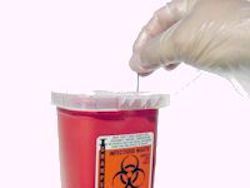Handling Needles/Sharps
- Do not bend, recap, or remove contaminated needles and other sharps unless such an act is required by a specific procedure or has no feasible alternative [29 CFR 1910.1030(d)(2)(vii)].

Have needle containers available near areas where needles may be found.
- Do not shear or break contaminated sharps. (OSHA defines contaminated as the presence or the reasonably anticipated presence of blood or other potentially infectious materials on an item or surface) [29 CFR 1910.1030(d)(2)(vii)].
Containerization
- Have needle containers available near areas where needles may be found. [29 CFR 1910.1030(d)(4)(iii)(A)(2)].
- Discard contaminated sharps immediately [29 CFR 1910.1030(d)(4)(iii)(A)(1)] or as soon as feasible into appropriate containers.
Sharps containers [29 CFR 1910.1030(d)(4)(iii)(A)(1)], must be:
- closable, puncture-resistant, and leak-proof on sides and bottom
- accessible, maintained upright, and not allowed to overfill
- labeled or color coded according to 29 CFR 1910.1030(g)(1)(i)
- colored red or labeled with the biohazard symbol
- labeled in fluorescent orange or orange-red, with lettering and symbols in a contrasting color [29 CFR 1910.1030(g)(1)(i)(C)]
Knowledge Check Choose the best answer for the question.
3-3. When handling needles or sharps, what should you not do unless there is no feasible alternative?
You forgot to answer the question!
